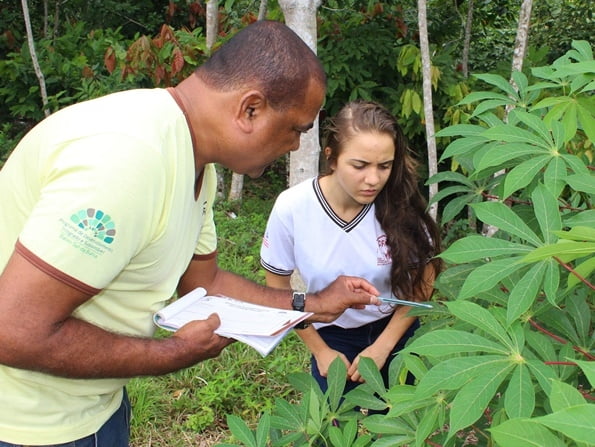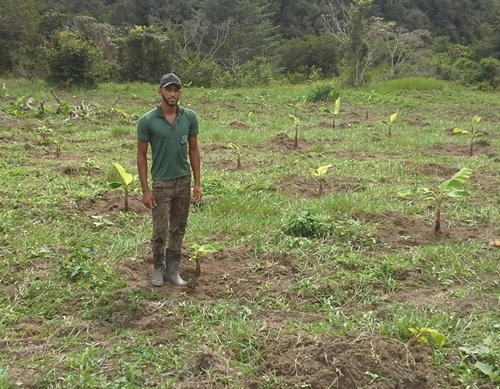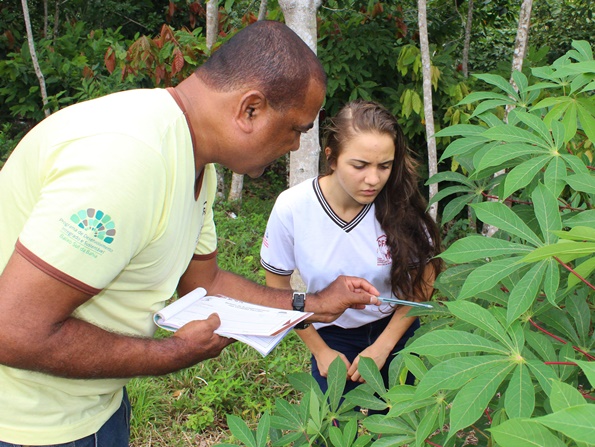Rural schools improve monitoring the progress of young graduates
Rural Families Houses supported by the Odebrecht Foundation have intensified the way how students’ progress is monitored
30 de May de 2019
Rural Families Houses supported by the Odebrecht Foundation have intensified the way how students’ progress is monitored
30 de May de 2019


Nineteen-year-old Moisés Yure has been successfully growing cassava, passion fruit and cocoa in the municipality of Valença in the Southern Bahia Lowlands, where he lives. In 2018, he concluded the vocational program in farming at the Presidente Tancredo Neves Rural Family House (CFR-PTN). Even after completing the course, he says he continues to receive constant assistance from the institution.
“To me, it has been quite similar to what used to happen when I was a student. The monitor visits my house and shares advice about my family’s farm, about what we can do better and how to add even more value to what we are producing. This is fundamental and I have increasingly felt better prepared to face the challenges,” he says.
Moisés’ story is similar to that of about 100 students who graduated last year from the CFR-PTN, the Agroforestry Family House (Cfaf) and the Igrapiúna Rural Family House (CFR-I): rural schools that participate in the Development and Integrated Growth Program with Sustainability (PDCIS), an Odebrecht Foundation initiative that seeks to transform the living conditions of people in the Baixo Sul region in the social, economic and environmental dimensions. CFR-PTN, Cfaf and CFR-I are institutions that combine higher education with vocational programs, which have intensified the way how students’ progress is monitored.
Presence of teacher

The Family Houses follow the Pedagogy of Alternation methodology, in which students spend one week full-time at school and two weeks in their properties, putting into practice all that they learned and receiving constant visits from the monitors. According to Quionei Araújo, director of CFR-PTN, maintaining an active relationship between teachers and students throughout the alternate phases is fundamental for the latter’s development after course completion. “When they reach the 3rd year, we start an exit Action Program. We want to know what the youth plan to grow and their plans for the future”, he adds.
Araújo says that this close contact with students helps fresh graduates to achieve the targets set at the end of the 3rd year. “This also enables the Family House to know how their actions in the field have been. We could devise a new plan, if required, so that the students evolve in the best possible manner”, he points out.
For Crislei Leite, a former student and currently a technician at CFR-I responsible for student relations, it is important to understand how graduates are putting into practice the technical knowledge acquired. “We observe their performance in terms of productivity and engagement to the community. We also evaluate the crops and what could be improved, besides clarifying doubts,” he said.
According to Romildo Oliveira, the teacher responsible for student monitoring at Cfaf, one of the key points is to understand the former students when they are on their own. “We know their difficulties and their dreams. We know that it is different to deal with challenges outside the Family House environment. This contact is important to encourage youth to be independent and to take charge of their destiny. This is the ultimate goal”, he concludes.
Do you wish to be
a partner in our projects, make
a donation or hire our technical consulting?
Send a message
right now!